Items
Search full-text
“Activism leads to a Disability Royal Commission”
- Jung Yoon
- Jung Hyoung Yoon
-
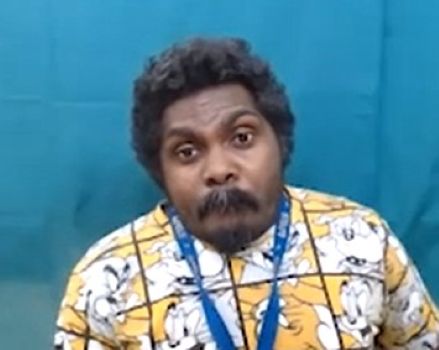 "Interview with Graham Wilfred Junior" Graham Wilfred Junior is a Yolngu man and artist with Incite Arts were he works with different mediums including filmmaking, writing, performing, digital art, music and painting. Interview Summary Graham, an emerging artist with spina bifida whose father inspired his passion for art, has pursued various art forms including painting, music, and digital art, and is venturing into theatre and filmmaking. His digital artwork, through the creation of the emoji app, helps teach the Arrente language, a part of his cultural heritage, and he seeks to expand his impact through acting and creating films. Graham's motivation is to both celebrate and inspire people with disabilities, aiming for recognition as an artist rather than focusing solely on his disability. Graham shares his journey with Incite Arts, highlighting his involvement in music workshops, acting classes, and script development, emphasizing the importance of representation and empowerment for individuals with disabilities, ultimately aiming to document his experiences and create impactful performances that leave a legacy to encourage others to pick up where he leaves off, ensuring the continuity of artistic expression within his community.
"Interview with Graham Wilfred Junior" Graham Wilfred Junior is a Yolngu man and artist with Incite Arts were he works with different mediums including filmmaking, writing, performing, digital art, music and painting. Interview Summary Graham, an emerging artist with spina bifida whose father inspired his passion for art, has pursued various art forms including painting, music, and digital art, and is venturing into theatre and filmmaking. His digital artwork, through the creation of the emoji app, helps teach the Arrente language, a part of his cultural heritage, and he seeks to expand his impact through acting and creating films. Graham's motivation is to both celebrate and inspire people with disabilities, aiming for recognition as an artist rather than focusing solely on his disability. Graham shares his journey with Incite Arts, highlighting his involvement in music workshops, acting classes, and script development, emphasizing the importance of representation and empowerment for individuals with disabilities, ultimately aiming to document his experiences and create impactful performances that leave a legacy to encourage others to pick up where he leaves off, ensuring the continuity of artistic expression within his community. -
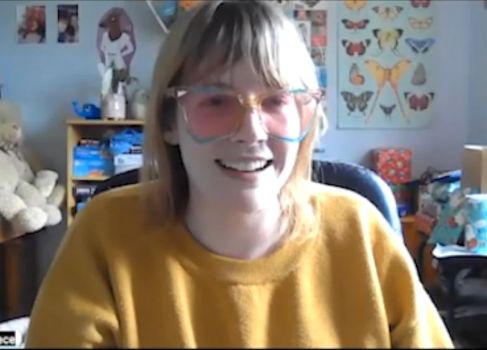 "Interview with Alex Creece" Alex Creece is writer, poet, editor, collage artist, and average kook living on Wadawurrung land. Interview Summary Alex Creece, focused on her experiences and journey as a disabled artist and writer in Australia. Alex discussed the importance of building a community and the challenges of balancing personal identity with maintaining professionalism in art. Alex expressed a desire for increased accessibility and recognition in the industry, highlighting the need for continued support of disabled artists. Throughout the conversation, the complexity of disability arts' visibility, identity politics, and the definition of creative success were explored, with Alex providing insight into her own work as well as broader industry trends and challenges.
"Interview with Alex Creece" Alex Creece is writer, poet, editor, collage artist, and average kook living on Wadawurrung land. Interview Summary Alex Creece, focused on her experiences and journey as a disabled artist and writer in Australia. Alex discussed the importance of building a community and the challenges of balancing personal identity with maintaining professionalism in art. Alex expressed a desire for increased accessibility and recognition in the industry, highlighting the need for continued support of disabled artists. Throughout the conversation, the complexity of disability arts' visibility, identity politics, and the definition of creative success were explored, with Alex providing insight into her own work as well as broader industry trends and challenges. -
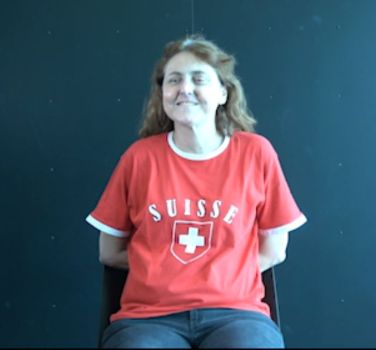 "Interview with Janelle Colquhoun" Janelle Colquhoun is an opera-jazz singer; corporate and community speaker; MC; producer; and writer. Interview Summary Janelle Colquhoun is a passionate and dedicated former opera singer, who in the interview speaks about, starting an entertainment agency to provide professional opportunities for artists with disabilities after losing her sight. She has produced over 1400 events, performed in a variety of concerts, and worked tirelessly to promote inclusivity in the arts, often by showcasing talented disabled artists to mainstream audiences. Janelle talks about how her work challenges the way people think about disability arts and inclusion, and strives to give equal performing opportunities by advocating for the recognition of artists with disabilities as professionals with the same quality of performance as any other artist.
"Interview with Janelle Colquhoun" Janelle Colquhoun is an opera-jazz singer; corporate and community speaker; MC; producer; and writer. Interview Summary Janelle Colquhoun is a passionate and dedicated former opera singer, who in the interview speaks about, starting an entertainment agency to provide professional opportunities for artists with disabilities after losing her sight. She has produced over 1400 events, performed in a variety of concerts, and worked tirelessly to promote inclusivity in the arts, often by showcasing talented disabled artists to mainstream audiences. Janelle talks about how her work challenges the way people think about disability arts and inclusion, and strives to give equal performing opportunities by advocating for the recognition of artists with disabilities as professionals with the same quality of performance as any other artist. - Julia Hales
- Jess Kapuscinski-Evans
- Chris Finnen
- Chris Brophy
- Catherine Ryan
- Anna Debinski
-
“Deaf film ‘A Silent Agreement’ is released in 2017” The Deaf film ‘A Silent Agreement’ was released in 2017 (written and directed by Davo Hardy). This romantic drama features a profoundly Deaf human rights activist and his filmmaker boyfriend with a speech impediment. It is said to be the first Australian film to feature Auslan as the main dialogue. Some scenes are entirely in Auslan. Screen Australia calls it the “first Australian film to feature Auslan.”
-
“Deaf activist and artist Asphyxia creates a music course and accessible music app for D/deaf people” Asphyxia, a profoundly Deaf Australian activist, artist, author and composer created a music course (2020) for people who are D/deaf and Hard of Hearing to write their own music. In 2023, Asphyxia also created an app called Amplio to make music more accessible to D/deaf people.
-
“Australian Caption Centre opened in 1982” The Australian Caption Centre was opened 13 September, 1982. A tour took place at the Australian Caption Centre in Sydney in the 1990s; the video (now available on YouTube) explains how the Centre worked. In 2005, the Centre sold its commercial operations including the captioning services to Red Bee Media and formed Media Access Australia.
-
“Sally Chance works with participants with disabilities, leading to the founding of Restless Dance Theatre” In 1989, UK-based community dance worker Sally Chance was invited to participate in the Come Out festival in Adelaide. She returned to South Australia the next year and begun the work with participants with disabilities which lead to the founding (alongside Tania Rose) of Restless Dance Theatre in 1991. Restless Dance Theatre continues to create and exhibit work by integrated ensembles. Their extensive performance history is available in the AusStage database. (see https://www.ausstage.edu.au/pages/organisation/7046)
-
“WHO International Classification of Impairment, Disabilities and Handicaps (1976)” International classification of impairments, disabilities, and handicaps: a manual of classification relating to the consequences of disease, published in accordance with resolution WHA29.35 of the Twenty-ninth World Health Assembly, May 1976
-
“Les Murray's poetry is influenced by his autism” In 1974, Les Murray wrote a poem about autism, ‘Portrait of the Autist as a New World Driver’. Over the decades since, autism has continued to be a theme, as recognised by Amanda Tink.
-
"Founder of the Victorian Association of Braille Writers and the Association for the Advancement of the Blind publishes her memoirs" In 1947, “Memoirs of Tilly Aston: Australia's Blind Poet Author and Philanthropist” was published. “Memoirs of Tilly Aston” is an autobiography by Mathilda Ann Aston who was the first blind person in Australia to go to university. Aston founded the Victorian Association of Braille Writers and the Association for the Advancement of the Blind.
-
"National Inquiry into the Human Rights of People with Mental Illness Report launched in 1993" The National Inquiry into the Human Rights of People with Mental Illness Report was launched 20th October, 1993. This led to deinstitutionalisation.
-
"Weave Movement Theatre formed" Weave Movement Theatre was formed in 1997 following a series of workshops (organised by Arts Access) led by Adam Benjamin, director of CandoCo, a world-renowned inclusive dance company. Janice Florence was asked to facilitate classes prior to the workshops.
-
"Back to Back Theatre established" The theatre company Back to Back was established in 1987. They are a drama group comprising artists with intellectual disabilities who have since toured both nationally and internationally in mainstream Australian theatre.
-
"Katie Ellis (2016) Disability Media Work: Opportunities and Obstacles. London: Palgrave." Reads, in part "Elevates disability media discussions beyond representation and access by considering employment and discriminatory attitudes in the media industry"
-
"Bree Hadley (2021) Ex/centric Fixations Project (theatrical play). In Sefel, John Michael, Slamcik Lassetter, Amanda, & Summerville, Jill (Eds.) At the Intersection of Disability and Drama: A Critical Anthology of New Plays. McFarland Publishers, Jefferson, USA, pp. 317-344.” "The Ex/Centric Fixations Project is a postdramatic performance work which renders the feeling of otherness visceral for spectators, without anchoring it any specific singlular experience of otherness, with the text unfolding with the musical flow and rhythm of a fugue state."
-
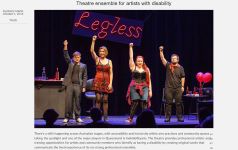 "Indelability Arts - Theatre Ensemble for Artists With Disability" News article by Kymberly Martin in Freedom2Live reads, in part, "The company, founded in 2015 by Rebecca Alexander and Catarina Hebbard, was inspired by local and international trailblazers and identified a gap within the creative sector for students with disabilities interested in pursuing a career in the arts after leaving school."
"Indelability Arts - Theatre Ensemble for Artists With Disability" News article by Kymberly Martin in Freedom2Live reads, in part, "The company, founded in 2015 by Rebecca Alexander and Catarina Hebbard, was inspired by local and international trailblazers and identified a gap within the creative sector for students with disabilities interested in pursuing a career in the arts after leaving school." -
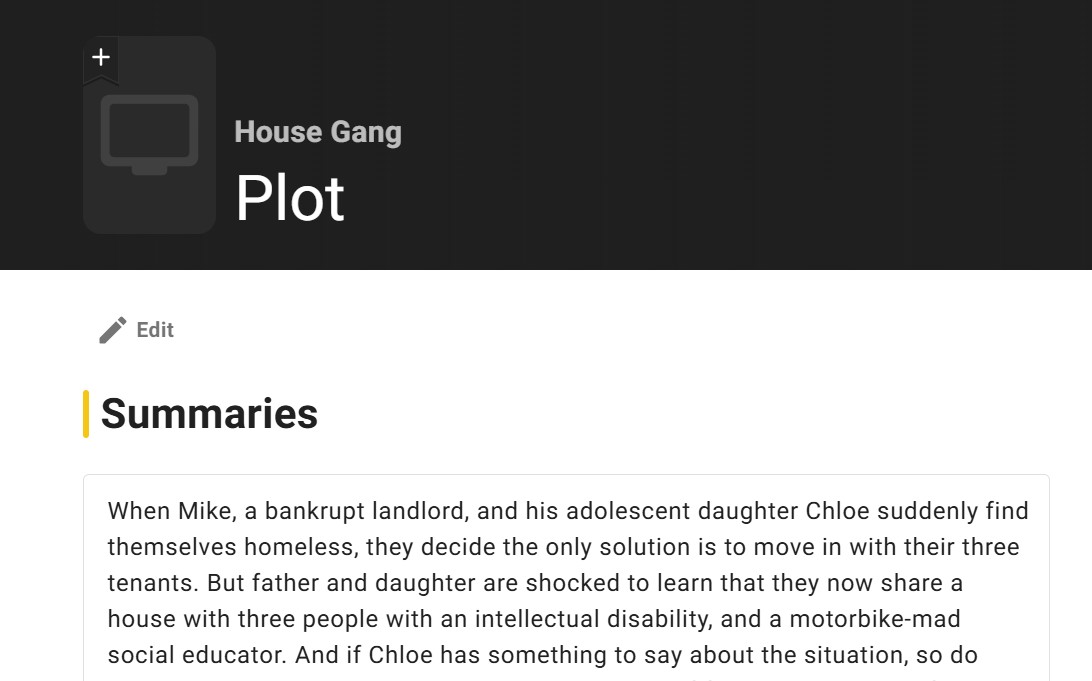 "House Gang - IMDB" Reads, in part "House Gang is an energetic and irreverent domestic comedy with a naughty sense of fun. Featuring three remarkable young actors, each with an intellectual disability, it takes an unconventional look at "family" in the 90s. Above all else House Gang celebrates diversity-you don't need to have a disability to be challenged by the problems of modern life. And being "normal" doesn't give us sole rights on love, sex, ambition, or laughter."
"House Gang - IMDB" Reads, in part "House Gang is an energetic and irreverent domestic comedy with a naughty sense of fun. Featuring three remarkable young actors, each with an intellectual disability, it takes an unconventional look at "family" in the 90s. Above all else House Gang celebrates diversity-you don't need to have a disability to be challenged by the problems of modern life. And being "normal" doesn't give us sole rights on love, sex, ambition, or laughter."
